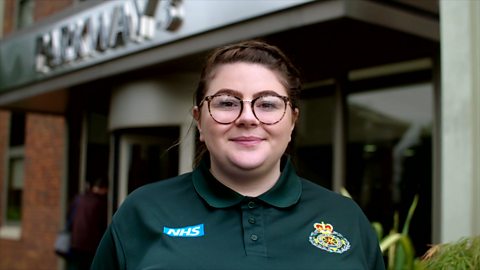Career choices can be tough. Should you follow your friends, take on the family business or make your own path? Should you choose something ‘safe’ and ‘sensible’, or pursue a passion?
BBC Bitesize spoke to four young frontline workers – forging careers as a firefighter, nurse, police sergeant and coastguard – about their passion for making a difference, and how they’re doing things their younger selves may never have thought possible.
People see me and they don’t expect me to be a firefighter
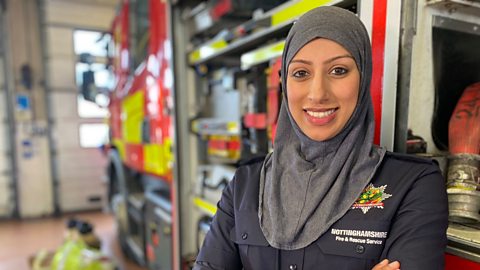
Uroosa, 28, knows she won’t be the person that comes to most people’s minds when they think of a firefighter. Being a Muslim woman, she’s faced several challenges whilst chasing her childhood dream of becoming part of the fire service.
Finding a hijab that would be suitable was the first task: “It had never been done by an operational firefighter in the UK before,” she says. She reached out to services abroad, eventually finding a suitable prototype in Thailand. It’s a work in progress - they are currently trying to create a more breathable and practical product for use in the UK.
“The fire service has supported me 100% throughout, allowing me time to fast and pray. I’m treated as a complete equal, I’m a firefighter on the ground and I’ve trained like everybody else.”
Uroosa hopes she’s helping to change perceptions: “I’m hoping that me being a firefighter will inspire a lot of people, especially young girls and Muslim people, to choose career paths that aren’t the standard.”
We care for every different type of person, so it’s important for our staff to be diverse too
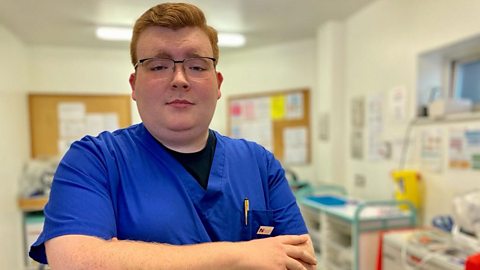
As a teenager, James wanted to get into politics, only working part-time at a nursing home to boost his university application. As it turned out, James enjoyed the role so much he decided to change his course from politics to nursing.
“I found engaging with patients really rewarding,” the 23-year-old says. “I was involved in the debating society and I was able to take the communication skills I’d learned and apply them to nursing.”
Now, a newly-qualified mental health nurse, James works with dementia patients: “I go home feeling that I’ve made a difference and that’s something you want to experience in your work life.”
James feels that nursing is still seen by some as a female role: “As nurses we care for every aspect of the community, and for every different type person, so it’s important for our staff to be diverse too and reflect that. It’s not a role that is gender specific – anyone who has the passion and drive to become a nurse can do so.”
Skills, rather than gender, set apart great nurses: “The best nurses think outside the box, and come up with new ideas,” says James. “We actively look for people who have a different mindset, and fresh ideas – people who can improve the profession.”
James was diagnosed with ADHD and dyslexia at school, and worried that he might struggle with the heavy note taking required in nursing. He says both his university and his workplace have been supportive of his needs: “Anyone who is neurodivergent shouldn’t be put off a career in nursing or any career for that matter!”
I’ve had people come up to me and say, “Are you really in the police?”
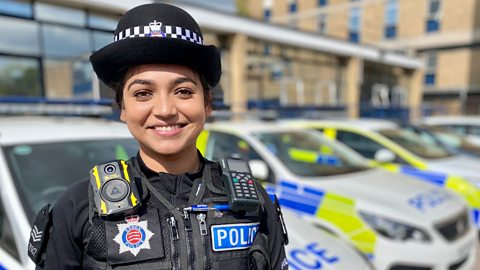
Anokhi, 25, is naturally an introvert. Although, you might not think that when you see her at work.
In her role as a police sergeant, Anokhi manages a team of 17 police officers who respond to 999 calls: “Policing forces you to be confident. You get put into situations where you’re in charge and you’re forced out of your comfort zone.”
Anokhi’s family were initially surprised when she applied to join the police force: “My family’s experiences with the police came out, ones which I’d never heard about before. My brother and his friends used to get stopped and searched regularly. My mum and her friends had negative experiences with the police growing up in the seventies and eighties too.”
Rather than putting her off, her family’s experiences spurred Anokhi on with her application: “I thought there should be someone from our community in the police – these negative experiences might be minimised if there were more officers who were from similar backgrounds.”
Before joining the force, Anokhi had an image in her head of police officers as big burly men: “That’s not me at all, and I wasn’t sure how I’d fit in there. Since joining the police, I’ve seen the wide variety of officers and staff members, and how wrong my view was, and I was glad to be wrong!”
This out-dated view is still shared by some members of the public it seems; people have approached Anokhi during her shift and questioned whether she is a member of the police force: “It’s quite funny actually,” she laughs, “I don’t know what they think I’m doing in the uniform otherwise!” Anokhi sees these questions as a chance to raise awareness: “It makes me think I’m helping to break the stereotype of what a police officer should be.”
Anokhi has already succeeded in changing her family’s preconceptions: “After my family saw how well I’d progressed in policing, and how happy I am in this job, they are thrilled for me. My grandma tells everyone that her granddaughter is a police officer, which is very embarrassing!”
_Initially, I wanted to go into the film industry _
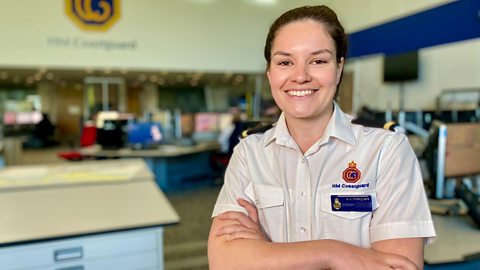
As a film student, Sydney worked as a RNLI lifeguard during her summer breaks: “I would hear the coastguards over the team radio and think that it would be a really interesting career. But I didn’t think that I could do it – I didn’t know anything about boats!”
After seeing an ad for a maritime operations officer role, Sydney realised that maritime experience wasn’t a requirement after all: “It is useful, but it’s not essential,” the 23-year-old says, “We train before we qualify – you learn on the job so it doesn’t matter if you’re not from a maritime background.”
“Everyone brings different skills,” Sydney says, “I’ve got a calm personality. You have to be able to work under pressure which can be stressful when you have people’s lives in your hands. I’ve seen incidents on the beach before in my time as a lifeguard so I know what’s going on. I can keep calm when dealing with it.”
Prior skills which also proved useful to Sydney were her maths and ICT capabilities: “When I was at school, I didn’t really enjoy maths; I used to think I’ll never use it. But we use these skills every day in this job, in chart work, reading co-ordinates and working out tides.”
As for working nightshifts, which may sound daunting, Sydney says: “Once I got used to them, they were actually enjoyable! I would recommend trying them if you don’t think you could do them.”
This article was first published in May 2022.
If you need advice about your career choices, or want to explore roles that you might not have thought about before, you can visit Bitesize Careers. You’ll find lots of advice and tips from people in the know.
Jobs that give back: My frontline career. video
Hear from four young people – a firefighter, nurse, police sergeant and coastguard – who are helping others via their frontline careers.
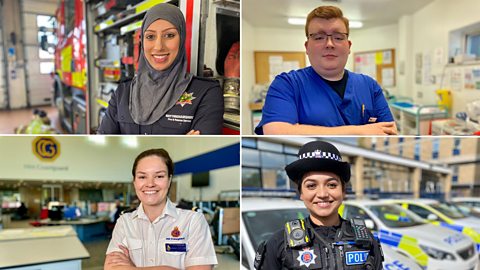
Quiz: Which emergency service would suit you best? quiz
All frontline workers need good communication skills, a cool head under pressure and a passion for making a difference. But which frontline emergency service would suit you best? Try our fun quiz to find out!

Job inspiration: Careers in healthcare and frontline services. collection
Hear from people working across the healthcare sector and in frontline services, including some roles you may not know existed!
